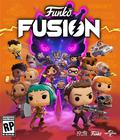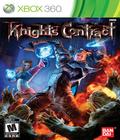The secret to having an amazing single-player adventure game is maintaining a balance between a good story and good gameplay mechanics. Though gameplay mechanics will trump story any day, an involving story can elevate the title from good to classic. Likewise, a good story isn't worth enduring if the game mechanics are far below par. Knights Contract fits the latter description well, unfortunately, as it has an interesting story, but the game mechanics aren't as polished as one would hope.
It is the Dark Ages, and the plague has devastated Europe. The witches, women who are blessed with supernatural powers and long lives, have been blamed for the plague although they've constantly helped people. During an execution of one witch, a curse is let loose on the executioner via a witch's spilled blood. A hundred years later, we meet Heinrich, the same executioner who is now blessed and cursed with the inability to die. On his travels, he meets the same witch who had cursed him, and the duo enters into a contract. If Heinrich can help Gretchen stop the other resurrected witches from wreaking havoc on the world, he can have his mortality back.
At first, the gameplay fits the mold of other action games like God of War or Dante's Inferno. Heinrich carries a scythe and can unleash devastating combos on enemies. He can also ask Gretchen to summon spells to hurt or incapacitate enemies with combined attacks, giving him the power to execute enemies in fewer blows. There's even the use of Quick Time Events (QTEs) during the last portion of boss battles, so anyone familiar with action games from the last few years should know the basics here.
The gimmick in Knights Contract is the mortality system. As a result of his curse, Heinrich cannot die. He can get sliced, bitten or even torn apart, but his death doesn't mean the end of the game. Gretchen, however, is still mortal and capable of dying despite her powers. Thus, the main concern for players isn't just the quick dispatch of enemies but also ensuring that the witch doesn't take on too much damage.
The issue of protecting Gretchen will most likely become the biggest complaint with the title. Her spells are powerful, and her attacks can certainly aid in a creature's demise, but her AI is terrible. Although you're the immortal one, she seems to do everything in her power to get in an enemy's path. The issue gets worse in certain environments; she seems to stand in areas where she's in harm's way, and she fights without dodging or getting behind cover. This aspect alone makes for a frustrating time, and this being a single-player affair adds to the heartache because there's no way for the player to correct it.
Another issue is with the pacing of the game. You'll see plenty of cut scenes, either made with the in-game engine or in full CGI. Some are good for furthering the plot while others are simply introductions to enemies or new situations. The sheer amount of scenes isn't troublesome, but the pacing is. Early in the game, you'll fight a group of monsters, watch a scene, take a few steps, and watch another scene unfold. The staggered pace of gameplay and cut scenes is difficult to enjoy because you're mostly watching things play out and doing little else. The pacing improves as you progress, but you'll still have instances where you defeat a boss and take a few steps before the level ends or another scene plays out. As interesting as the plot may be, cutting down on the number of scenes and increasing the number of gameplay moments would have been a better choice.
It's unfortunate that Knights Contract suffers from these gameplay issues because the combat is rather good. There's a nice sense of force attached to the attacks, with each delivered hit being just as satisfying as the last. The use of magical attacks is also satisfying when they hit their intended target, and the combos resulting from using them in tandem are good enough to satisfy anyone's bloodlust. If there is one thing about the combat that won't be as pleasing, it would be the fatalities. There's a copious amount of blood that springs forth from the moves, but none of the fatalities look spectacular. The only reason you'd still use them would be to quickly dispatch enemies.
The problems with the game continue in the graphics department, but they only appear in places you wouldn't expect. Cut scenes are riddled with instances of screen tearing to the point that it's distracting. Oddly enough, it only happens during cut scenes and nowhere else in the game. The title also suffers from slowdown in the oddest places. Lock on to a large creature in combat, and you'll see it lose some frames of animation. Go into a menu screen to upgrade your characters or save the game, and you'll notice the game struggling to generate the menus. Again, it's odd because the rest of the game runs at a smooth frame rate.
A majority of the environments is still bathed in browns and grays that we've all grown to loathe during this gaming generation. The little touches in those environments, such as reflective water, that make the graphics pleasing to the eye. Not many of the monster designs are too imaginative, as the exposed muscle and twisted bone structure look like they've been ripped out of Namco Bandai's recent Splatterhouse. The character designs, on the other hand, look fine despite showing some overused traits, such as multiple facial scars and ornate tattoos.
The controls are done well, for the most part. Basic movement and combat are responsive, and it's not difficult to pull off combos and advanced magic moves. The execution finishers are annoying to pull off the first time around, especially if you aren't counting on the magic spells to make contact. Once you get the timing down, though, you'll be pulling off execution after execution in no time. QTEs, on the other hand, can be painful because some moves have a smaller time window. Since the punishment for missing a move is that the opponent's health meter is partially replenished, you'll often have to go through a sequence twice before you're victorious.
The other frustrating factor with the controls is respawning after being badly injured or dismembered. Respawning requires you to mash away at the A button until you come back to life, but the amount of mashing needed is close to absurd. Since Gretchen often loses a large amount of life due to her negligence while you're busy putting yourself back together, you'll sometimes find yourself waiting for the "Game Over" screen to save yourself some finger fatigue.
In terms of audio, Knights Contract is almost flawless. As expected, the effects are great, with the right amount of oomph for each hit. The music is comprised solely of epic orchestral pieces that nicely fit the theme. It's something you'll want to turn up while fighting. The game only features an English vocal track, but the acting is done well enough that you won't really miss a Japanese track. The sound is by far the strongest element of the game.
It's a shame that Knights Contract falters due to design issues and quirks. The plot is interesting despite its simplicity, and the core combat system is familiar but still quality material. It has a great look, it sounds terrific, and the controls aren't as complicated as one would expect. The issues are overwhelming, though, and when you lose for the umpteenth time because you failed a Quick Time Event or you couldn't resurrect in time or Gretchen is begging to be hit, all the praise is quickly overshadowed. Patient gamers will be able to find some fun in this game, especially when the higher difficulty levels open up, but for everyone else, Knights Contract makes for a good weekend rental.
Score: 6.5/10
More articles about Knights Contract











 Knights Contract re-creates the era of swordsmen and magic with astonishing visual appeal while keeping players at the edge of their seats with stylized over-the-top action.
Knights Contract re-creates the era of swordsmen and magic with astonishing visual appeal while keeping players at the edge of their seats with stylized over-the-top action.































